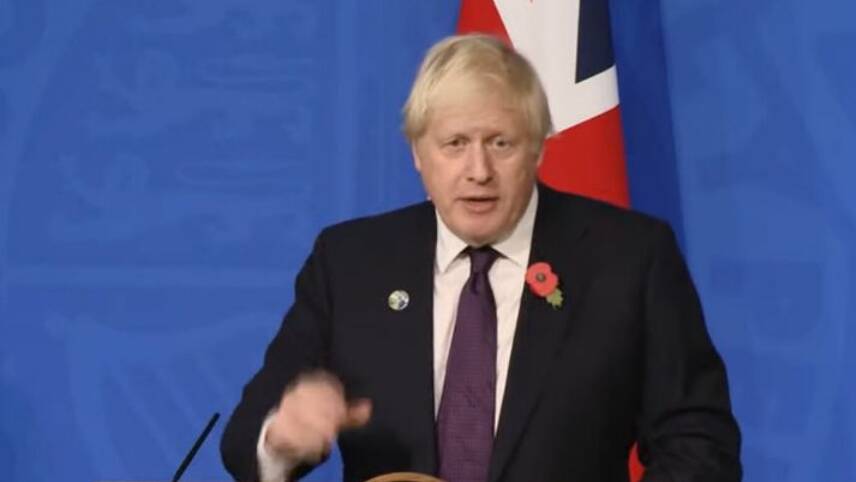Register for free and continue reading
Join our growing army of changemakers and get unlimited access to our premium content

Pictured: Johnson giving a press conference after COP26 in November. Image: UK Government
Speaking in the House of Commons during Prime Ministers’ Questions on Wednesday (9 February), Labour Part Leader Kier Starmer asked Johnson why he had rejected his Party’s calls for a windfall tax on the sector. This call to action has been supported by some Liberal Democrats, as well as the Green Party and various environmental and consumer rights groups, with support growing after BP and Shell posted multi-billion-pound upticks in profits this month. SSE has also upped its profit forecasts.
By Greenpeace’s estimations, raising the tax on the sector from 40% to 70% temporarily would raise an extra £4bn to help households meet the impending increase of dual-fuel bills by up to 54%.
Johnson said that a windfall tax would “hit the energy companies at precisely when we need to encourage them to go for more gas because we need to transition now to cleaner fuels”.
He added: “What they [Labour] would do, and you know, this is a global problem Mr Speaker caused by the spike in gas prices, but what they would do is clobber the oil and gas companies right now with a tax that would deter investment in gas just when this country needs gas as we transition to green fuel.
“It would be totally ridiculous and it would raise prices for consumers.”
Green groups have argued that most energy majors are continuing to allocate the bulk of their investment to fossil fuels rather than to renewables and to other technologies that will enable the low-carbon transition, like electric vehicle (EV) charging and hydrogen.
BP has promised for years that it’s ‘greening’ its operations. In reality, its investment in renewables (as a share of capital expenditure) declined from 5.6% in 2018 to 2.6% in 2019, according to the industry lobby group OGUK.
/2— Tessa Khan (@tessakhan) February 8, 2022
It has also been highlighted that Chancellor Rishi Sunak has repeatedly stated that the Government is acknowledging that the price crisis is caused by gas, meaning that the solution will not lie in more fossil fuels.
New oil and gas
The Government’s continued support of new oil and gas in the North Sea has attracted criticism from green groups and from other nations, who argue it undermines the UK’s credibility as COP26 host and could undermine its 2050 net-zero target and 2035 commitment to end unabated gas-fired electricity generation. The International Energy Agency (IEA) has recommended that no new oil and gas exploration and extraction capacity is brought online to give the world the best chance in the transition to net-zero.
Last month, the Oil and Gas Authority (OGA) granted approval for the Abigail oilfield in the North Sea to developers Ithica Energy.
There have, subsequently, been reports that the Treasury is pushing the Department for Business, Energy and Industrial Strategy (BEIS) and the OGA to fast-track the development process for six additional oil and gas fields in the North Sea.
A BEIS spokesperson told edie the six fields in question already had their licences approved pre-2022.
“There will continue to be ongoing demand for oil and gas over the coming years as we transition to cleaner, more secure forms of energy, generated in this country,” the spokesperson added.
“As the Business Secretary has said, turning off our domestic source of gas overnight would put energy security, British jobs and industries at risk and we would be even more dependent on foreign imports.”
Gas is notably an internationally traded commodity, imported and exported in line with price signals. In other words, countries cannot simply choose to keep a larger portion of their domestically generated gas, which has environmental and citizens’ groups asking why the Government is pushing so hard on domestic generation as a solution to the price crisis. The UK typically imports more gas than it exports.
Reacting to the PMQs, Greenpeace UK’s policy director Dr Doug Parr said: “The Prime Minister is providing cover for big companies to pay out huge sums to shareholders from their massive profits whilst the public are left feeling the pinch.
“More oil and gas from the North Sea won’t change that – it will be sold to the highest bidder, may not even be used in the UK, and will worsen the climate crisis already being felt around the world.”
Groups including Greenpeace have been urging the UK Government to develop longer-term plans on renewable energy and energy efficiency as Ministers address the price crisis. It was announced this week that funding auctions through the Contracts for Difference (CfD) scheme will occur annually, rather than every two years, in a bid to boost the nation’s clean energy supply chain.
Sarah George


Firstly the oil and gas companies already pay a higher rate of Corporation Tax on any profits so the Treasury has already had a "windfall".
Secondly, BP lost 6 billion in 2020
Thirdly, we will continue to need oil and gas for decades in order to produce the materials that go into making wind turbines, solar panels, electric vehicles and the "elastic" in our pants.
It’s not just fossil fuel!